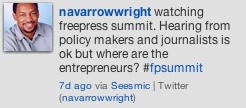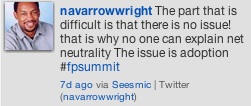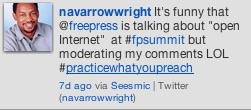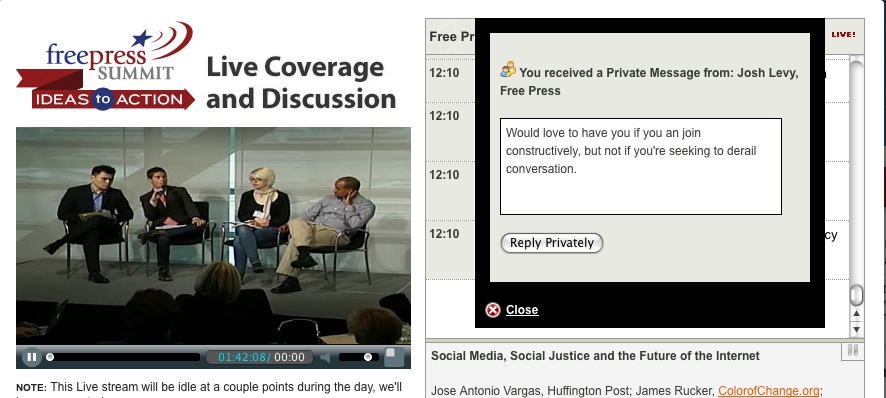By now most people have heard of the FCC 's proposed attempts to regulate the Internet. You can read about how those changes differ from the current Internet environment here on the Huffington Post. This is all a part of the larger Net Neutrality debate that has been going on for some time now, and the FCC's current proposal reflects talking point from one of the beltway's biggest media lobbying shops, Free Press.
Free Press, who's conduct in the midst of this debate -- ironically -- is neither representative of Internet freedom nor of responsible media conduct, insists that if we don't make the regulatory changes currently being suggested by the FCC, we will lose the current openness and freedom of the Internet that we all presently enjoy today. Even our ability to freely express ourselves online and engage in our right to free speech will be hampered, so they claim (even though there are no documented cases of such infringement on legally protected conduct to date). Remember this point.
Considering the supposed motivation behind Free Press's net neutrality push, then, my experience with their Ideas to Action Summit last week came as quite a surprise. I wasn't invited to their Washington, D.C. conference, but because the event was live streamed, I decided to attend virtually. They also had a live chat room - courtesy of Cover It Live - that enabled online audiences to engage in dialogue during and about the event. Online attendees were making comments and asking questions, so I decided to join that as well.
The conference agenda was loaded with speakers that are in agreement with Free Press, or at least think they should be, so there was not a lot of real debate or discussion going on at the conference. Since I know open dialogue about these issues is important to Free Press, I decided to participate in the live chat room discussion. When I first logged in, I received a quick message from Josh Levy of Free press welcoming me to the chat room, but also immediately requesting that I play nice. I thought to myself, "does he know me???" I quickly moved on and started making comments.
I was actually posting my comments to twitter at the same time so you get to see the story unfold:

My first question was posted and some other participants agreed with my point. How can you talk about the current state of the Internet without entrepreneurs present to discuss how the current Internet had enabled them great opportunities? Moreover, how can you discuss the Internet future without taking into consideration the conditions that would be beneficial or disadvantageous to the small business owners upon whom this country is relying to help rebound our economy?

This was in response to a point that James Rucker made about how imperative it is to make changes to ensure that people are not shut out. My question was simple, give me some real examples of this and I might even agree with you. I hear these points all the time with no real examples given. Where's the data here?

This was in response to a point made on a panel about how difficult it is for people to give a clear definition for Net Neutrality. I thought my comment was clear and valid, so I was eager to see how the chat room would react and was ready for some real dialogue. Sadly that never happened because this comment never saw the light of day in the chat room. I sent a few more test comments to see if my theory was correct and it was. I had been SHUT OUT of the chat room. And by whom? Not the ISP, but by the Free Press moderator. I didn't think my comments were offensive in any way, I was just offering up my points of view in the "free" and "open" forum that is today's Open Internet, and low and behold I got shut out because someone didn't like what I had to say. Luckily for me, I could still let the world know what was going on via twitter. So I focused my attention there.


I continued to watch the summit even though the same people who claim to be fighting to make sure this day never comes apparently shut out my voice. So a few minutes after my second post on twitter about this issue, I saw this message pop up in the Free Press chat room:

Wait! Say it isn't so. Are they saying I can't be involved because I'm not saying what they want me to say? That on the Open Internet, it's okay to censor someone's opinions just because they are not aligned with theirs???
I have to admit I was really confused at this point. I even went online and read some older postings to make sure, but once I did, I knew I was right. Free Press is for the "Open Internet" but only if that openness doesn't occur during a Free Press event, I guess. This isn't the first time this has happened--good luck posting comments on any of the Free Press blog sites. Content censorship (cloaked under the guise of comment moderation) is far more detrimental to the free expression of speech and ideas online, and it actually has nothing to do with the current net neutrality debate? Why, because the perpetrators of these online "shut outs" are not ISPs, but rather content creators and aggregators, and that's a part of the net neutrality debate that hasn't been discussed much these days.
Good for me that on the current Internet, the one I've enjoyed for years, the one that is truly open and free, I can go to places like Twitter, Facebook and pretty much any other site I want to let my voice be heard. I don't have to worried about being censored for my opinions or having my right to free speech compromised.
So, in closing I would just this: Free Press, I'm sorry if you thought I was trying to derail your conversation, but as always I'm just trying to make sure that people understand both sides of this issue, and get a chance to hear all the information they need in order to make informed decisions about our collective Internet future. Let's put the cards on the table. We all enjoy and support a free and open Internet as it is. We all want people to be able to access and use that free and open platform, when they want to and how they want to. But to maintain the kind of Internet experience we all want, let's practice what we preach: if we say we want free and open, let's keep it that way universally, not just when it's convenient.
